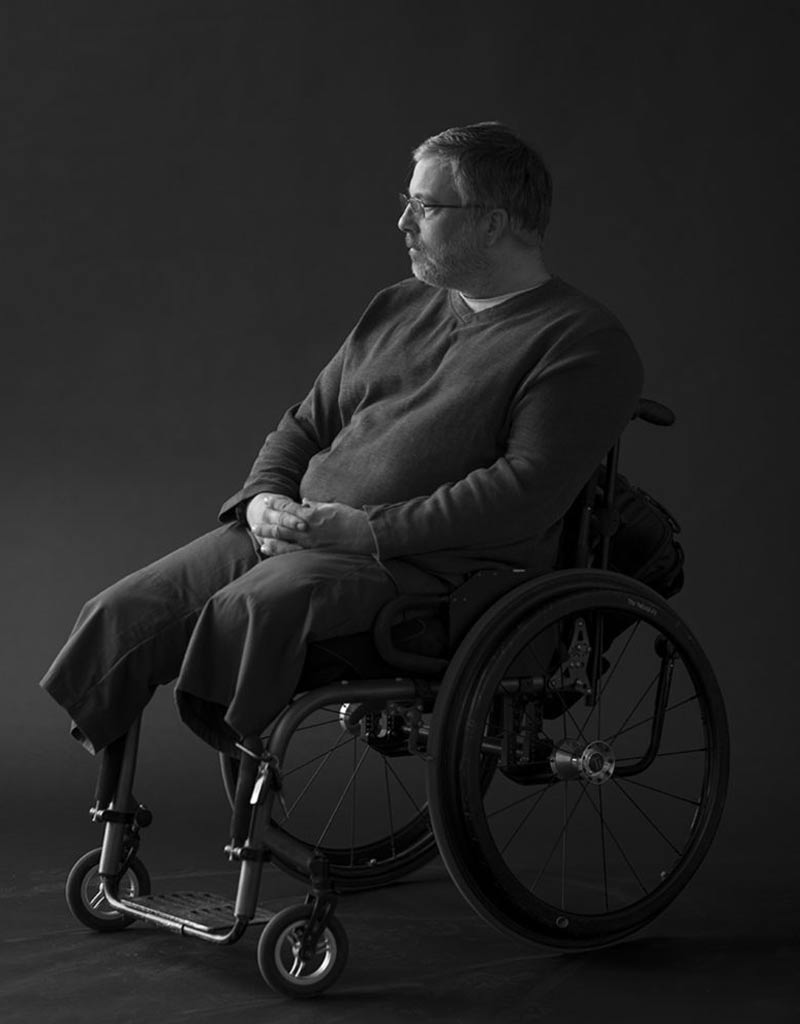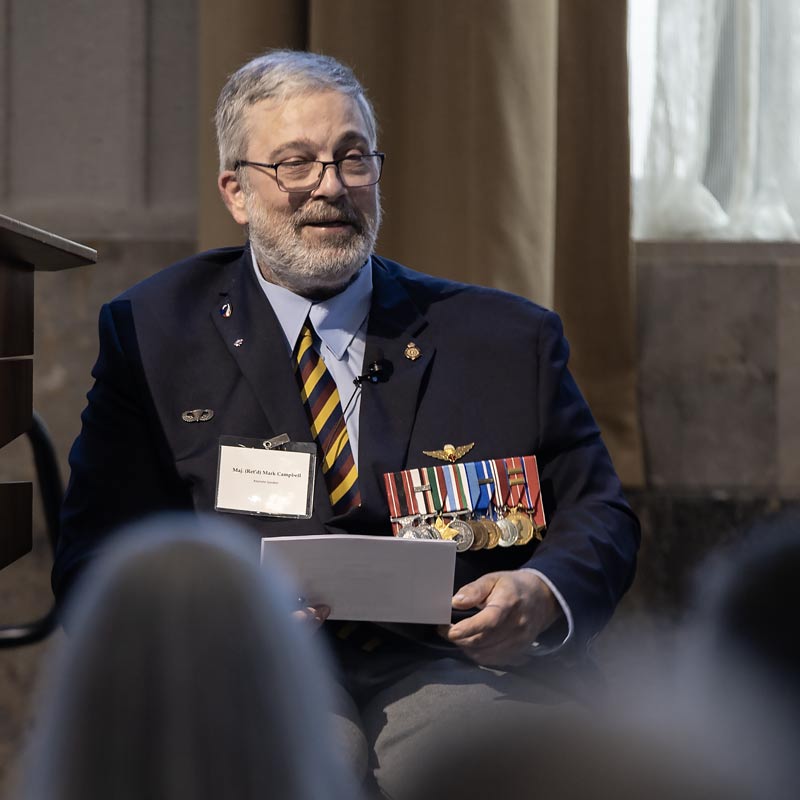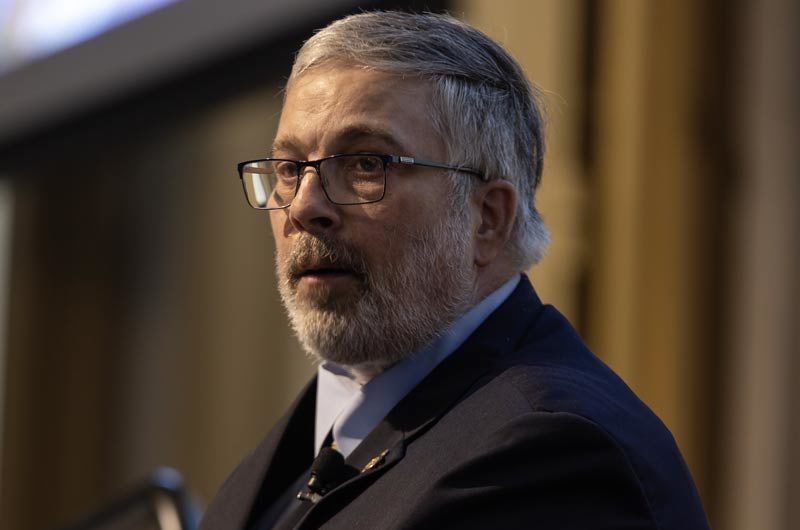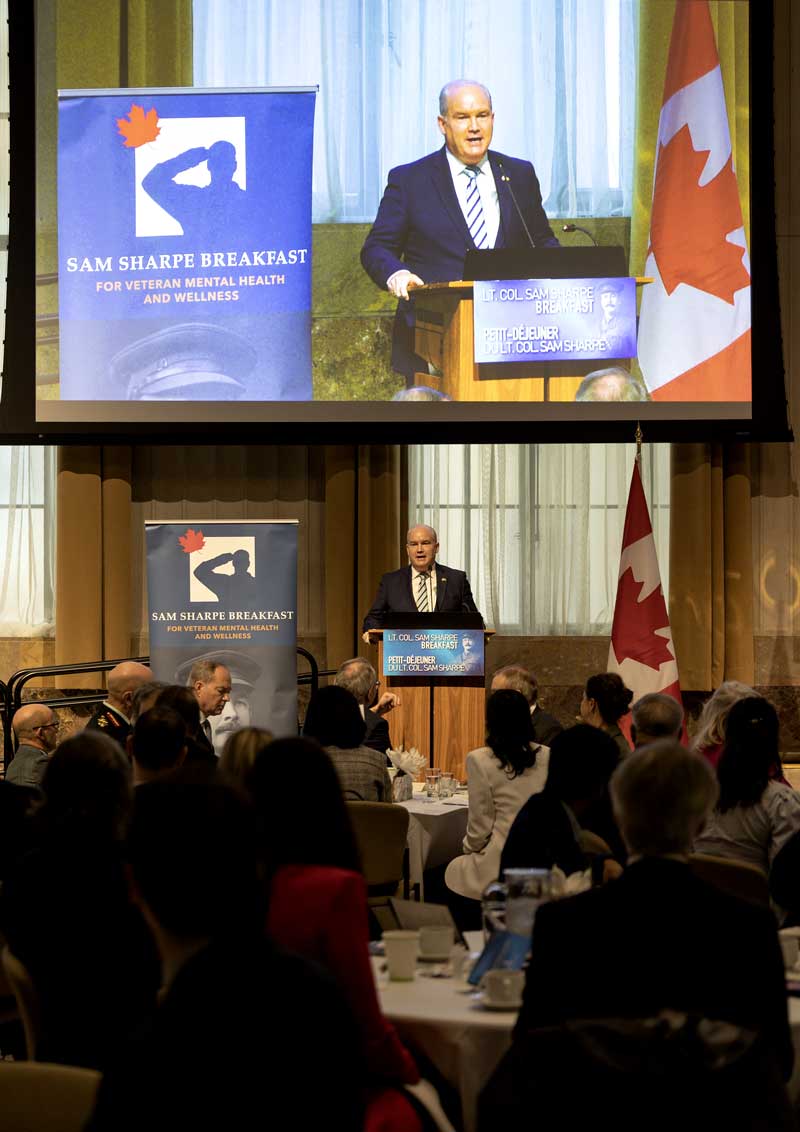
Retired major Mark Campbell was wounded while serving in Afghanistan with the 3rd Battalion, Princess Patricia’s Canadian Light Infantry, in 2008. He was photographed by Legion Magazine in 2017 as part of The Wounded, a series of profiles and a photoessay exhibited at the Canadian War Museum Exhibition. It is now touring Canada.[Stephen J. Thorne/LM.]
Speaking to the annual Sam Sharpe Breakfast for Mental Health in Uniformed Service, the retired major described the life-saving measures his fellow Patricias took in mid-firefight after he was targeted by a remotely detonated bomb in 2008, only for him to die and be resuscitated on an operating table in Kandahar.

Mark Campbell, a former major of the 3rd Battalion, Princess Patricia’s Canadian Light Infantry, lost both legs above the knee to a Taliban bomb. He addressed the Sam Sharpe breakfast in Ottawa on May 2. [Stephen J. Thorne/LM.]
“How is that right? How is that just? How is that fair? It is not,” he said.
It was what he called a “betrayal by the very institutions that we depended on to have our backs when we were injured or killed.”
“We were told through our entire careers that if you are injured in the line of duty or you are killed, your family and you will be taken care of,” he said. “It was lie. It was an outright lie.
“Hands down, this was the most personally devastating of all of my injuries. It was 100 per cent a mental health injury; it was 100 per cent avoidable…and it is that sense of betrayal that hurts the most.”
The federal government and Veterans Affairs Canada, in particular, must correct these inequities, he said. The problems were identified around 2007 and a fix is long overdue. “Make ‘one veteran, one standard’ the truth, not the BIG LIE.”
Campbell said his family also suffered. His two children began struggling in school, and they are all still in counseling. The stress was so bad, Donna, a veteran and his wife of more than three decades, left the military.
“I wouldn’t be here if it weren’t for her,” he said.
“Were I to allow myself to ponder over what I have seen and what I have suffered thro [sic]…I would soon become absolutely incapable of ‘carrying on.’”
The breakfast has been held for 10 years in the name of Lieutenant-Colonel Sam Sharpe, a member of Parliament who organized and commanded the 116th (Ontario County) Battalion out of his own riding of Ontario North.
They fought at Vimy Ridge, Avion and Passchendaele, taking heavy losses. The horrors were taking their toll on the former town solicitor from Uxbridge, Ont.

Mark Campbell, a former major of the 3rd Battalion, Princess Patricia’s Canadian Light Infantry, lost both legs above the knee to a Taliban bomb. He addressed the Sam Sharpe breakfast in Ottawa on May 2. [Stephen J. Thorne/LM.]
He was hospitalized with what was then described as “general debility” shortly after he was awarded the Distinguished Service Order in early 1918. He died by suicide, jumping from a Montreal hospital window on May 25, 1918, his name stigmatized and all but forgotten by his parliamentary peers for nearly a century.
In 2018, a plaque bearing Sharpe’s likeness was unveiled in Parliament’s Centre Block. Uxbridge erected a statue in Sharpe’s honour and, in 2019, the Durham Regional Courthouse was renamed the Lieutenant-Colonel Samuel S. Sharpe, DSO, MP Courthouse.
Hosted by its co-founders, retired lieutenant-general Romeo Dallaire and former Conservative leader Erin O’Toole, an air force veteran and one-time veterans affairs minister, the breakfast brings together parliamentarians, armed forces members, veterans, first responders and mental health advocates.
Each event features a speaker on the topic of service-related mental health injuries and wellness.
The issues aren’t going away. Other wounded veterans continue to face similar issues as Campbell.
For example Private Thomas Welch, who died by suicide at Canadian Forces Base Petawawa in Ontario, on May 8, 2004, less than three months after returning from Afghanistan. His mother, Anita Cenerini, was named the 2018 National Memorial (Silver) Cross Mother.

Former Conservative leader Erin O’Toole addresses the Sam Sharpe breakfast audience. [Stephen J. Thorne/LM.]
—
Read more about Mark Campbell’s epic and inspiring journey at https://legionmagazine.com/it_crushed_me/
Advertisement




















